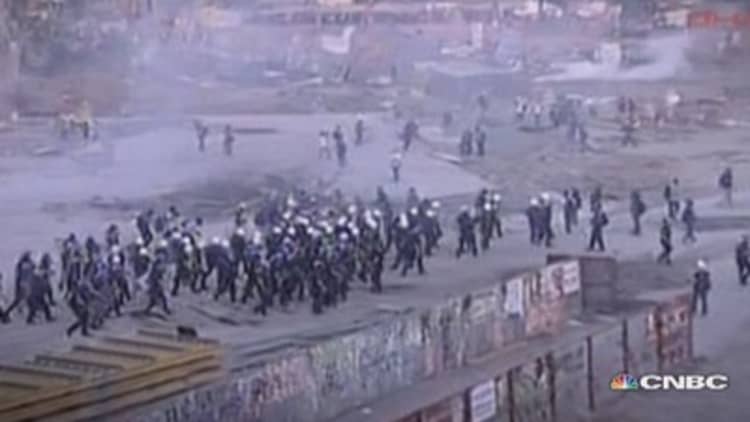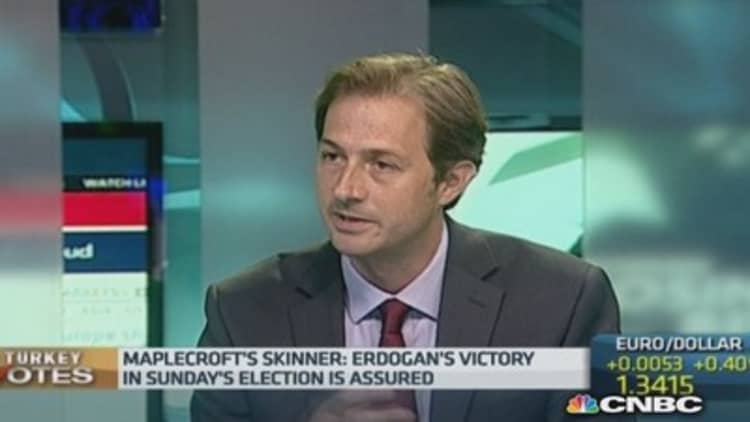
Facing the end of his final term as Prime Minister, Recip Erdogan is looking for promotion Sunday, scoring a victory as Turkey's first popularly elected President and paving the way for a major change in the way that office is run.
But investors and economists are worried that Erdogan's aggressive rhetoric towards the country's central bank and worrying moves toward making Turkey a more conservative society could derail the country's long-term growth.
"In the short-term, an Erdogan victory would be positive for investors. Investors don't like change, they like continuity and that's what the market will want," says Jonathan Friedman, Turkey analyst for Control Risks.
"However, what it comes down to is whether the current growth model is sustainable for Turkey."
A growing population means the pressure is on for the Ankara government to engineer a higher level of domestic economic growth. One man largely credited for Turkey's economic prosperity in the eyes of investors, Deputy Minister of Economy Ali Babacan will be unable to stand for parliamentary elections next year. And the Prime Minister's economic populism, while stirring to his base of some 40 percent of the Turkish electorate, does fall short when it comes to concrete solutions.
"Turkey had 4 percent growth in the first quarter, but to accommodate new entrants into the work force they need 5 percent. So although 4 percent sounds great for most countries, it's not enough for Turkey," says Friedman.
"To get to that next level of growth, they're going to really need to have some structural reforms and that includes more independence for regulatory agencies, more innovation from Turkish companies and more focus on education. And so far, we've seen Mr. Erdogan focused on continuing a credit-fueled consumption and construction boom. That's just not a sustainable path."
Add to that the political uncertainty surrounding the Prime Minister's bid for the Presidency. Erdogan's plans to consolidate power behind the office of the Presidency and his increasingly authoritarian reaction to criticism, particularly by local media and political opponents, are giving some investors cause for pause.
"We're going to have efforts to rewrite the constitution following the elections which will be a very tough political process," says Friedman.
"There's going to be a lot of political uncertainty and risk coming for turkey over the next year and a half…[but] this economic populism is just electioneering— Erdogan knows his party has really benefited from being the pro-business party for the past ten years and they know that they're continued political success is underpinned by strong an economic performance. "
Once considered a model of political Islam, Erdogan's government is now seen as authoritarian. Ministers regularly speak of political intrigue and conspiracy; the Prime Minister himself has accused political opponents and prosecutors involved in the investigation of corrupt officials in his inner circle of attempting a coup. Erdogan's public outbursts and gaffes over the last 24 months—a series of political blunders that many observers once assumed would put a swift end to his presidential ambitions—have had little impact on his prospects.
"We're going to see a very different presidency than we have seen in the past. Erdogan is going to use these [new powers] to the maximum," says former U.S. Ambassador to Turkey James Jeffrey. "We are concerned about these manifestations of a more authoritarian approach but I want to emphasize Erdogan is not undemocratic. He believes in the vote particularly as he assumes he's going to always win."

Meanwhile, Erdogan's attempts to shape the regional narrative with his "no enemies" foreign policy have met with little success. Backing the Muslim Brotherhood and Hamas, arming rebel elements in Syria and refusing to engage in a dialogue with Israel has left the country with few friends and little to show for their efforts. Even Turkey's oil deals with the Kurdish Regional Government—a major play by the Turkish government that pitted them directly against the Iraqi government in Baghdad —are now threatened by some of the very Islamic militants they helped—however inadvertently—to arm.
"Turkey's recent foreign policy has not been successful at all," says Ambassador Jeffrey. "On the other hand, Turkey is an isle of stability. The NATO alliance means free trade relations with Europe and other underlying strengths mean that Turkey can make a lot of regional mistakes in foreign policy but they can get away with it."
And so—with the economy expected to top the agenda for voters heading to the polls on Sunday—it's as yet unclear whether Turks will be willing to trade Mr. Erdogan's policy prescription for upward economic mobility for a less than open society. Or whether that's a price that's just too high to pay.
Follow us on Twitter: @CNBCWorld



